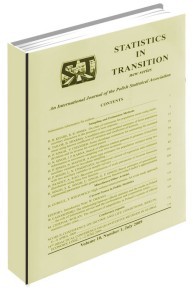Expliting Ordinal Data for Subjective Well-Being Evaluation
Expliting Ordinal Data for Subjective Well-Being Evaluation
Author(s): Marco Fattore, Filomena Maggino, Alberto ArcagniSubject(s): Economy, ICT Information and Communications Technologies
Published by: Główny Urząd Statystyczny
Keywords: subjective well-being;multidimensional ordinal data;partial order
Summary/Abstract: The evaluation of subjective well-being, and of similar issues related to quality of life, is usually addressed through composite indicators or counting procedures. This leads to inconsistencies and inefficiency in the treatment of ordinal data that, in turn, affect the quality of information provided to scholars and to policy-makers. In this paper we take a different path and prove that the evaluation of multidimensional ordinal well-being can be addressed in an effective and consistent way, using the theory of partially ordered sets. We first show that the proper evaluation space of well-being is the partially ordered set of achievement profiles and that its structure depends upon the importance assigned to well-being attributes. We then describe how evaluation can be performed extracting information out of the evaluation space, respecting the ordinal nature of data and producing synthetic indicators without attribute aggregation. An application to subjective well-being in Italy illustrates the procedure.
Journal: Statistics in Transition. New Series
- Issue Year: 16/2015
- Issue No: 3
- Page Range: 409-428
- Page Count: 20
- Language: English

